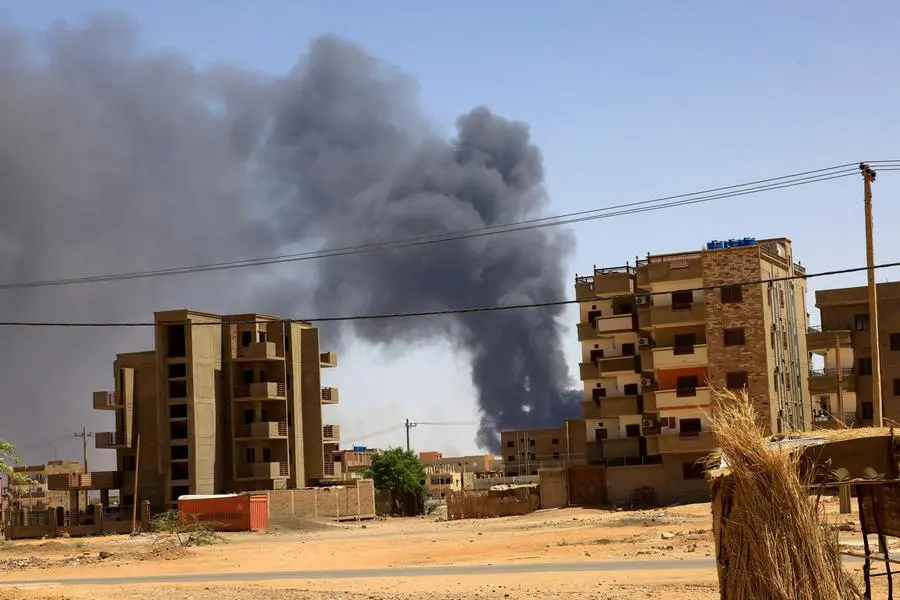PHOTO
KHARTOUM - Heavy air strikes pounded southern areas of Sudan's capital on Thursday as clashes flared near a military camp, witnesses said, in fighting that has displaced nearly 1 million people and left residents of Khartoum struggling to survive.
Air strikes by the army targeting the paramilitary Rapid Support Forces (RSF) were heard across several residential neighbourhoods in southern Khartoum, including near the Taiba camp, while a police reserve force aligned with the army battled the RSF on the ground, the witnesses said.
Strikes could be heard across the Nile in the Sharg al-Nil district as well.
The army has mainly used air power and heavy artillery as it tries to drive back the RSF, which spread out across large areas of Khartoum and its adjoining cities of Bahri and Omdurman across the Nile after fighting erupted on April 15.
"The bombardment and the clashes don't stop and there's no way to flee from our homes. All our money is gone," said Salah el-Din Othman, a 35-year-old resident of Khartoum.
"Even if we leave our houses again we're afraid that gangs will loot everything in the house ... we are living a nightmare of fear and poverty."
Violence also flared about 1,000 km (620 miles) west of Khartoum in Nyala, one of Sudan's largest cities and the capital of South Darfur state, witnesses said. One said heavy artillery including tanks could be heard firing for the first time since a local truce was declared.
Armed gangs had started carrying out robberies in El Obeid, another major city and a trading hub in North Kordofan state, witnesses said.
Both army chief Abdel Fattah al-Burhan and RSF commander Mohamed Hamdan Dagalo, known as Hemedti, are thought to have remained in Khartoum throughout the fighting.
On Wednesday the army released a video showing Burhan dressed in army fatigues greeting troops at what appeared to be the army headquarters in central Khartoum.
AID SUPPLIES LOOTED
According to latest estimates, more than 840,000 people have been displaced within Sudan and over 220,000 have fled to neighbouring countries.
The U.N. World Food Programme said it was ramping up its operations across at least six states in Sudan to assist 4.9 million vulnerable people, as well as assisting those fleeing to Chad, Egypt and South Sudan.
"The fighting in Sudan is devastating lives and livelihoods and forcing people to flee their homes with nothing but the clothes they are wearing," WFP East Africa director Michael Dunford said in a statement.
The U.N. said on Wednesday that more than half of Sudan's 46 million population needed humanitarian assistance and protection, launching a $3 billion aid appeal.
It also said it had received reports of "horrific gender-based violence" in Sudan.
Sudanese non-governmental groups have reported such incidents amid the chaos and looting in Khartoum.
The Emergency Lawyers, an activist legal group, said in a statement that armed men had entered a university in Omdurman located in an area controlled by the RSF on Saturday and that a number of men had raped two women the lawyers group said were foreigners.
The Darfur Bar Association, a human rights organization, said on Tuesday they had spoken to three women who said they were raped after they ventured into central Khartoum searching for food supplies, without specifying who was involved.
The RSF has said its soldiers are instructed to protect civilians and those who fail to do so will be prosecuted.
The aid effort has been hampered by the deaths of some humanitarian workers early in the conflict and repeated cases of looting.
Medical aid agency MSF said that on Tuesday armed men had broken into its warehouse in Khartoum and taken two cars filled with supplies.
Burhan and Hemedti took the top positions on Sudan's ruling council following the 2019 overthrow of strongman Omar al-Bashir in a popular uprising. They staged a coup two years later as a deadline to hand power to civilians approached and they began to mobilise their respective forces.
The latest conflict broke out after disputes over plans for the RSF to join the army and over the future chain of command under an internationally backed deal for a political transition towards civilian rule.
Talks mediated by the United States and Saudi Arabia in Jeddah have so far failed to secure a ceasefire.
(Reporting by Khalid Abdelaziz in Dubai and Nafisa Eltahir in Cairo; Writing by Aidan Lewis; Editing by Hugh Lawson and Andrew Heavens)




















